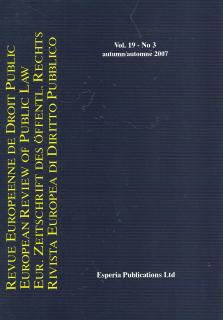
Jurisprudence
Constitutional / Constitutionnelle
2005-2006
Belgium / Belgique
Benoit Gors / Matthieu Lys
Assistants de recherche à la Faculté de droit de l’Université catholique de Louvain,
avocats au barreau de Bruxelles
This chronicle concerns the decisions pronounced by the Court of Arbitration in 2005 and 2006 but it does not constitute a presentation of all the rulings given during this period. It focuses on the most important rulings concerning various topics of the Belgian constitutional case law. The plan of this chronicle is structured in two parts. Traditionally, the first one is devoted to questions linked to the control of constitutionality of norms: the extent of the Court’s jurisdiction of control, the impact of the special law of 9 March 2003 on the control of the constitutionality of laws, the force of res judicata of a ruling given on a preliminary issue, the assessment of admissibility conditions of an application for annulment, requests in suspension. The second part is devoted to one of the essential missions of the Court, henceforth a favourite field of the control of constitutionality: the respect of rights and freedoms. The principles of equality and non-discrimination, the right to a fair hearing and the jurisdictional guarantees, the legislation relating to aliens, the international humanitarian law and the freedom of press are respectively examined.
Cette chronique a pour objet les décisions rendues par la Cour d’arbitrage durant les années 2005 et 2006, mais ne constitue pas une présentation de tous les arrêts rendus pendant cette période. Elle se concentre sur les arrêts marquants touchant des thèmes divers dans la jurisprudence constitutionnelle belge. Le plan de cette chronique s’articule autour de deux parties. Classiquement, la première est consacrée aux questions liées au contrôle de constitutionnalité des norme: l’étendue de la compétence de contrôle de la Cour, l’incidence de la loi spéciale du 9 mars 2003 sur le contrôle de constitutionnalité des lois, l’autorité de chose jugée d’un arrêt rendu sur question préjudicielle, l’appréciation des conditions de recevabilité d’un recours en annulation, les demandes en suspension. La seconde partie est consacrée à l’une des missions essentielles de la Cour, désormais terrain de prédilection du contrôle de constitutionnalité: le respect des droits et libertés. Sont respectivement analysés: les principes d’égalité et de non-discrimination, le droit au procès équitable et les garanties juridictionnelles, le droit des étrangers, le droit international humanitaire et la liberté de la presse.





















